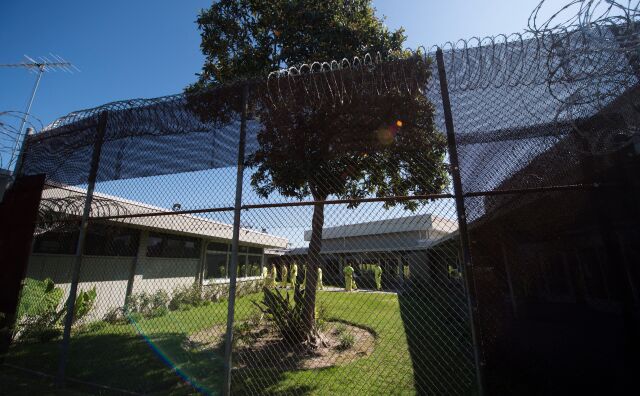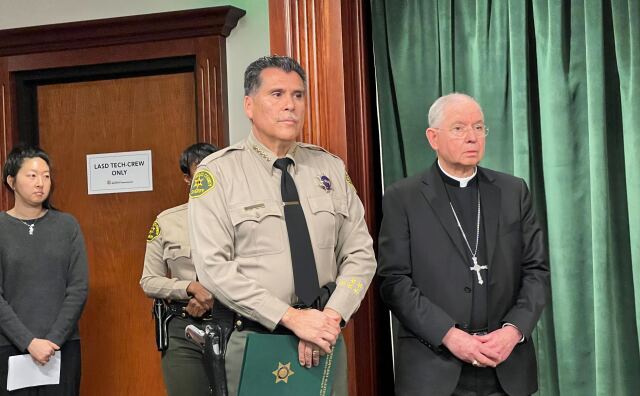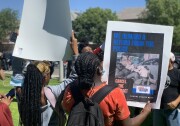LA Sheriff's Watchdog Confirms Deputies Disproportionately Detain, Arrest, Discipline Black Teens In The Antelope Valley

Los Angeles County Sheriff’s deputies disproportionately contact, cite, and arrest Black students in the Antelope Valley, and those students are also disproportionately suspended and expelled at higher rates than other racial groups, according to a report by the County Inspector General’s office.
The analysis was spurred by a year-long investigation into allegations of racial discrimination in Antelope Valley high schools by LAist and ProPublica.
Our investigation found that Black teenagers accounted for 60% of deputy contacts in Lancaster high schools, although they made up only about 20% of the enrollment in those schools.
Inspector General Max Huntsman’s office reviewed Sheriff’s Department data for the 2019-20 school year (LAist and ProPublica had examined the 2018-19 school year), and said its findings corroborated our investigation. In addition, it said the problem may be worse than the numbers indicate, due to flaws in the department’s data collection system.
The practice of making public denials without factual support is fundamentally inconsistent with California law controlling the conduct of law enforcement officers.
The report also slammed the Sheriff’s Department for failing to provide any evidence for claims it made that challenged the validity of our analysis.
“The practice of making public denials without factual support is fundamentally inconsistent with California law controlling the conduct of law enforcement officers,” investigators wrote.
In an emailed statement, the Sheriff's Department said it can't provide immediate comment because it has not yet fully reviewed the report.
"What we can say is Sheriff Alex Villanueva takes allegations of misconduct very seriously and we will provide a more detailed response once we review these findings," it added.
The inspector general's office presented its findings to the Civilian Oversight Commission on Thursday. It was the oversight panel that had asked the inspector general’s office to look into the matter in the wake of our report.
Capt. John Lecrivain, the head of the Lancaster sheriff's station, told commissioners last October that our investigation was a “a very entertaining piece of fiction.” He struck a different tone at Thursday's meeting.
"This is a serious concern to the department and we relish the opportunity to be involved in the discussion and find some solutions," he said, adding that the department had looked back at its data and "we did find that there was some disparity in the contacts with the students."
He asserted that deputies were primarily being asked to contact students by school staff. The inspector general's analysis disputes this claim, but notes that data entry errors may also contribute to the issue.
Assistant Inspector General Mahdi Mohamed said at the meeting that the Sheriff's Department also did not comply with investigators' request nine months ago for information — including body-worn camera video — related to an incident at Lancaster High School in which a 16-year-old student, MiKayla Robinson, was body slammed by a sheriff's deputy.
17/ The Antelope Valley Union High School District school board voted in July to keep deputies on campus.
— Emily Elena Dugdale (she/her) (@eedugdale) September 29, 2021
But in August, a video of 16-year-old MiKayla Robinson being body-slammed by a deputy at Lancaster High School went viral, reigniting the debate. pic.twitter.com/RRalZ7XEGm
Mohamed said that made it hard to "investigate the reason for the deputy's contact with the student." The office finally received the body cam video in the past few days, he said.
Robinson's attorney, Lisa Bloom, said she filed a new complaint in May against both the Antelope Valley Union High School District and the Sheriff's Department, alleging civil rights violations. Neither the district nor the department has responded to the complaint.
"The findings of this new report that Black students are cited, arrested, suspended and expelled at disproportionately higher rates than other students should be a wake up call," Bloom said in a statement. "Immediate action must be taken to protect Black students from further harm."
Underreported Data
The data examined by the inspector general’s office and by LAist and ProPublic came from the Sheriff’s Automated Contact Reporting system (SACR).
Huntsman’s office analyzed nearly 17,000 contacts by Lancaster station deputies — who are assigned to Antelope Valley high schools as school resource officers — during the 2019-20 school year. Roughly 400 contacts were conducted at or around 11 high schools in the Antelope Valley patrolled by Lancaster deputies.
Investigators said the SACR system “is inaccurate and significantly underreports significant data.” In a report issued earlier this month, the office found the Sheriff’s Department underreported more than 50,000 stops and more than 70,000 arrests between 2018 and 2019.
“Any findings based upon this review of SACR data likely understates the issues identified in this report, particularly those relating to racial disparities,” investigators wrote. They called on the Sheriff’s Department to improve the system’s accuracy.

The analysis found Black students made up about 67% of the contacts made by Lancaster station deputies, while comprising only about 18% of total school enrollment.
In comparison, Latino students — who make up the majority of the school’s population, about 64% — accounted for only 26% of deputy contacts.
Black Students Cited And Arrested More
The inspector general’s analysis also showed that Black students were issued nearly 70% of all citations resulting from contact with deputies. Black students also made up nearly 60% of all arrests resulting from contact with deputies.
The report said these findings were consistent with our previous reporting.
Sheriff’s deputy Justin Ruppert, team leader of the Lancaster station’s school safety unit, told LAist and ProPublica that the vast majority of deputies’ contacts on campuses are based on referrals from school staff and administrators — rather than being initiated by law enforcement.
The inspector general’s office, though, found “the majority of school contacts were self-initiated by deputies.” It noted that deputies may not be coding calls correctly, and that according to the California Department of Justice, a request for service from a school administrator constitutes a call for service.

Black, Latino Students Have Less Contact With Deputies At School Than Outside
Huntsman’s office also found that Black and Latino high school-aged youth had fewer recorded contacts with deputies outside of school than inside.
Notably, white students had more contact with deputies outside of school than inside.

Black Students Suspended, Expelled More Than Other Students
The inspector generals’ office found that Black students made up 54% of total suspensions in the 2019-20 school year.
About one in seven Black students at the high schools have been suspended, a rate more than twice the statewide average.
Black and Latino students both received about 47% of expulsions, though Black students were expelled at a disproportionately higher rate given that they only make up 18% of the high school population.
A Call For More Transparency, Training, And Collaboration

The office listed a number of recommendations “aimed at increasing the transparency, accuracy and efficacy of oversight of School Resource Deputies and the safety of community youth.”
The recommendations included:
- Following established law that requires records to be disclosed to the inspector general’s office
- Including body camera footage
- Working with established youth programs like the Division of Youth Development and Diversion under the Office of Diversion and Reentry
- Partnering with school-based programming through organizations like the Social Justice Learning Institute
The investigators also recommended that the Sheriff’s Department expand its training curriculum “to educate all patrol-related deputies on their opportunity to act as informal counselors and gateways for at-risk youth to non-criminal County services.”
Last June, the L.A. County Board of Supervisors passed a motion requiring the county CEO to report back on a plan to collect and publish data relating to deputy contacts with youths.
Our investigation last fall profiled Barron Gardner, a high school history teacher working for Antelope Valley district. Gardner had become a reluctant spokesperson for a growing movement, driven primarily by Black and Latino residents, to get LASD deputies off school campuses.
On Thursday, Gardner said over the phone that the numbers in the Inspector General's report "aren't any surprise" to school staff and Antelope Valley residents.
"I could have guessed those numbers off the top of my head," he said.
Gardner also said he wished the inspector general's report — in addition to recognizing that his Black students were over-policed — gave more context for the issues that his Black students face. He listed some, "homelessness, foster care, parents and prisons" — and systemic racism. Gardner said all are factors that prevent Black students from accessing socio-emotional and mental health resources.
"This is what we think is the best way to deal with it — with cops," he said.
-
In December 2020, Sadie and Eddie Martinez were falsely accused of attempted kidnapping by a white woman who had been shopping at a Michaels craft store at the same time as them. This is the story of Sadie's fight to clear their names and bring her accuser to justice.
-
An Orange County public defender has tallied 57 tainted criminal cases stemming from the county's informant scandal. New revelations of alleged misconduct could affect dozens more.
-
Ryan Clinkunbroomer was found in his patrol car near the Palmdale station. He was a third-generation sheriff's deputy.
-
L.A. County prosecutors say David Bloom scammed nine people out of nearly $250,000. Bloom, a twice-convicted con man known in the ‘80s as the “Wall Street Whiz Kid,” allegedly trolled for victims in a Hollywood apartment building and local bars.
-
Edward Bronstein died in March 2020 while officers were forcibly taking a blood sample after his detention.
-









